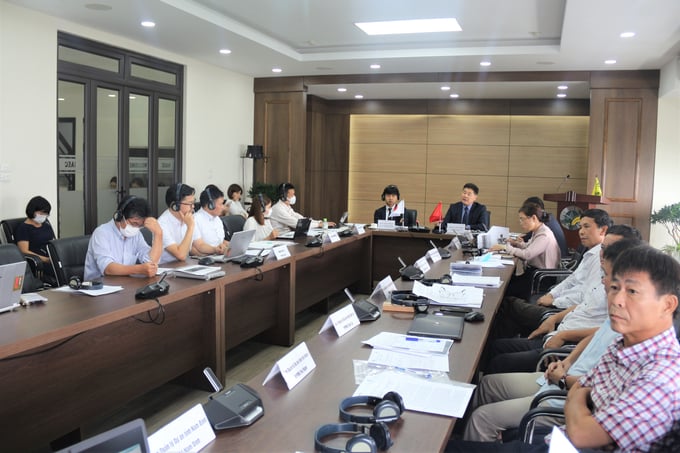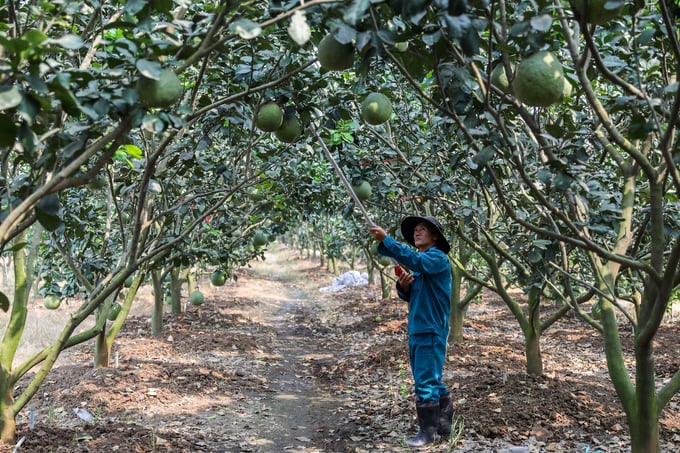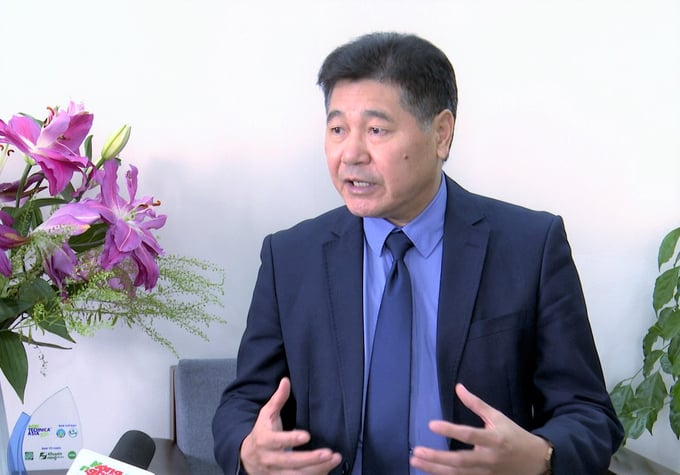May 18, 2025 | 00:53 GMT +7
May 18, 2025 | 00:53 GMT +7
Hotline: 0913.378.918
May 18, 2025 | 00:53 GMT +7
Hotline: 0913.378.918

The knowledge-sharing workshop on the project "Strengthening the value chain of safe crops in the northern provinces of Vietnam". Photo: Pham Hieu.
The National Center for Agricultural Extension (MARD) and the Japan International Cooperation Agency (“JICA”) have just held a knowledge-sharing workshop on the project "Strengthening the value chain of safe crops in the northern provinces of Vietnam" ("the Project").
The workshop aimed to identify challenges and lessons learned to strengthen the safe crop value chain toward sustainable agricultural development in Vietnam.
Hai Duong province currently has over 15,500 hectares of fruit and vegetable production areas applying the GAP process. More than 5,000 hectares of vegetables are produced according to export standards. The province also has 94 vegetable and fruit growing areas with over 1,200 hectares certified according to VietGAP and GlobalGAP processes.
To strengthen the activities of building safe crop value chains and marketing safe crops locally, over the past time, Hai Duong Project Management Board said that the province has deployed support for zoning production, and granting VietGAP certification of safe vegetable production areas, partial support of materials (seeds, fertilizers, pesticides) for production areas.
In the work of market development, the province has organized conferences to promote trade and consumption of agricultural products inside and outside the province; organizing conferences to meet businesses and encourage investment in the fields of agriculture and rural areas; organize professional training on trade promotion; organize and participate in domestic and foreign fairs for businesses, farms, cooperatives and production households to promote and introduce products.

Before starting production, farmers must consider who will buy their products and define which markets they will approach.
Sharing at the workshop, Son La Provincial Project Management Board said that the province has policies and programs to support production, planning planting areas, building product brands, preliminary processing, processing, and consumption, and introducing and promoting Son La agricultural products on electronic trading floors, developing websites to present, broadcast, sell, expand the online sales market, and connect with businesses and cooperatives having a stable consumption market.
Besides, Son La province is also promoting the high-tech application of agriculture, and organic agriculture, striving to become a center for processing agricultural products, fruits and medicinal plants in the Northwest region, strengthening research and development of hi-tech agriculture.
With 26 commercial centers, 142 supermarkets (including 110 general-purpose supermarkets dealing in food and foodstuffs), mainly concentrated in inner-city districts; 455 markets, over 1,800 convenience stores, 809 safe fruit stores, over 128 business chains of agricultural products, food…, currently, Hanoi is a good business market and a gathering place for transshipment of goods across the country.
Currently, Hanoi City has a monthly vegetable production output of 67,299 tons, while the city's demand is 103,300 tonnes/month. Thus, the production of self-produced vegetables in the area only meets 65.1% of the total demand. The amount of vegetables that need to be supplied outside the city is 36,001 tonnes or 34.9%.
Mr. Le Quoc Thanh, Director of the National Center for Agricultural Extension, expressed his expectation that the project will directly support producers through the model of cooperatives to develop value chains to markets with the participation of farmers from 7 Northern provinces and valuable lessons from JICA.
Accordingly, the project will promote the link between producers and the market. Also, helping people access markets for high-quality products, transparent markets in certifications, and certificates of production chains.

Mr. Le Quoc Thanh expects the project to directly support producers through the cooperative model. Photo: Pham Hieu.
The Project has selected localities strongly developing fruit and vegetable production, thereby developing plans for each value chain from production to the table.
"Through the project, the National Agricultural Extension Center and JICA also want to shape the market mindset for farmers. Before starting production, people must consider who will buy their products, define which markets they will approach, and then have the accompanying production process. The formation of a market mindset for producers is also in line with the current development orientation and spreading of agricultural economic thinking," said Mr. Le Quoc Thanh.
To do that, the Director of the National Center for Agricultural Extension said that the Project has identified and selected clear targets for the markets that the products of the cooperatives participating in the project need to target. After that, the project will provide technology and technical solutions to the product audience that can meet the standards of the target market.
According to Mrs. Kaigai Mariya, an expert from JICA Japan Office, in charge of the project, through the Project, JICA will provide technical support from experts in many fields to improve the value chain of safe crops.
“Currently, Vietnam is promoting safe production and applying VietGAP standards to farmers. Besides increasing income, safe production is also a mandatory condition for farmers to participate and maintain sustainability in the market,” noted Mrs. Kaigai Mariya.
Through capacity building and technical support, JICA's representative hopes Vietnamese farmers can maintain safe production even after the project ends.
Translated by Ha Phuc

(VAN) 14 out of 35 domesticated elephants in Dak Lak province have had their living conditions improved, with 11 of them currently participating in the non-riding elephant tourism model.

(VAN) Muong Nhe Nature Reserve hopes that being upgraded to a national park will lay the foundation for forest protection efforts to be carried out in a systematic, modern, and sustainable manner.
/2025/05/16/3923-2-171845_52.jpg)
(VAN) Lower costs, higher yields, and improved soil quality are outstanding benefits that soybeans bring when integrated into the crop rotation system.

(VAN) The 'For a Green National Environment' programme aims to promote a green lifestyle, support businesses in implementing ESG practices, and turn Net Zero commitments into concrete actions.

(VAN) Cold-barn systems efficiently manage environmental and temperature conditions, which aids in the prevention of respiratory diseases in pigs and protects them from the vectors that transmit African swine fevers.

(VAN) To tackle challenges, the project 'Addressing key technical bottlenecks in the grouper supply chain in Vietnam' has been underway since 2024.

(VAN) The project 'Disease-Resilient and Sustainable Cassava Production Systems in the Mekong Region', funded by the Australian Center for International Agricultural Research (ACIAR), is being implemented from 2024 to 2028.